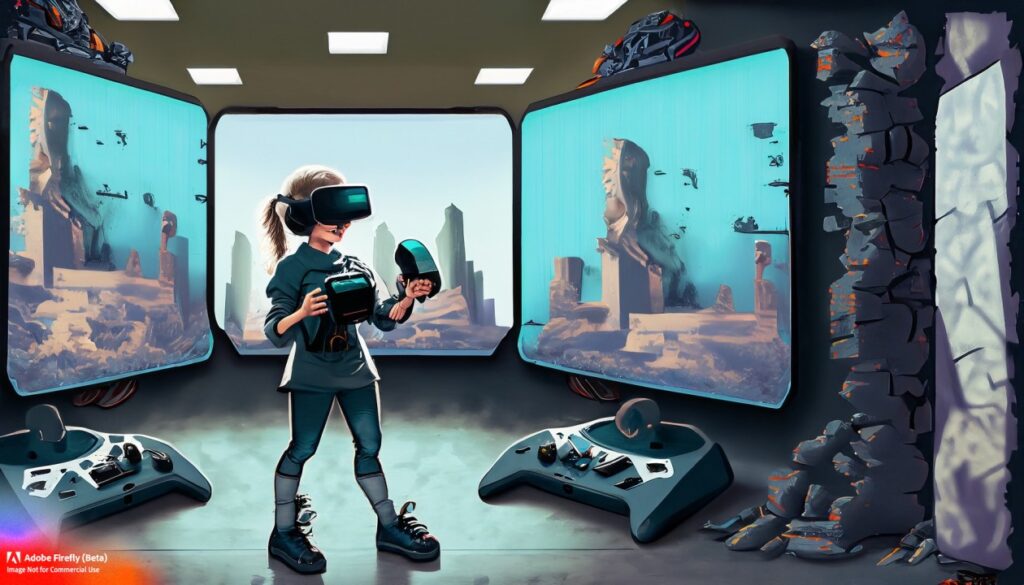The world of gaming has been witnessing a transformative phase, with evolving trends and technologies playing a pivotal role in its future trajectory. This comprehensive discourse delves into the future landscape of gaming, deciphering the potential changes that the next decade might usher in.
Gaming Demographics: A Changing Landscape
The concept of gaming is no longer confined to any particular age or gender. With an estimated 3.6 billion gamers projected by 2025, the gaming landscape is more diverse than ever. In fact, the gender gap in gaming is closing, with women constituting a significant portion of the gamer population. This shift in demographics offers an opportunity to diversify game development teams, promoting inclusivity and expanding creative horizons.
The Power of Artificial Intelligence
In the realm of gambling and betting, the advent of Artificial Intelligence (AI) has ushered in a revolutionary era, particularly in the domain of slots game. Leveraging AI-powered algorithms, developers are orchestrating an array of captivating and enthralling slot experiences. Beyond mere entertainment, AI’s prowess plays a pivotal role in refining game mechanics, identifying glitches, and expediting the production pipeline. As AI technology progresses, the horizon of slot gaming unfolds with boundless creativity and innovation, promising players an ever-evolving landscape of excitement and possibility.
The Metaverse: A New Digital Frontier
The Metaverse, an interconnected virtual universe, is being heralded as the next frontier in gaming. While the idea of a digital replica of the real world might seem daunting, smaller metaverse projects are showing promise. Companies are gradually uniting their games in brand-owned metaverses, creating more manageable digital realities. The metaverse stands as a testament to the future of gaming, representing a new phase of immersive, interconnected experiences.
The Rise of Augmented and Virtual Reality
Augmented Reality (AR) and Virtual Reality (VR) technologies are revolutionizing the gaming industry. AR games, which superimpose digital elements onto the real world, have gained popularity due to their interactive nature. On the other hand, VR offers a fully immersive experience, transporting gamers into a three-dimensional virtual world. Despite some challenges, such as the need for more ergonomic headsets and more immersive VR experiences, the future of AR and VR in gaming looks promising.
Cloud Gaming: A New Era of Accessibility
Cloud gaming, or game streaming, is transforming the way games are played. With the ability to stream games directly from remote servers, players can enjoy high-quality gaming experiences without the need for high-end hardware. This shift towards cloud gaming is democratizing access to cutting-edge gaming experiences, fostering cross-platform play, and shifting gamers towards a subscription-based model.
Mobile Gaming: A Growing Powerhouse
Mobile gaming has witnessed exponential growth, with smartphones becoming a preferred platform for many gamers. The convenience and accessibility offered by mobile gaming have made it a dominant force in the gaming industry. With advancements in mobile technology and the rise of social gaming, mobile gaming is set to redefine the gaming experience in the future.
The eSports Phenomenon
The eSports industry is booming, with major tournaments drawing massive audiences and professionalizing the competitive gaming scene. Despite some challenges, such as over-reliance on sponsorships and public misconceptions, eSports is poised for significant growth. With increased diversity and the introduction of AR/VR extensions, the eSports industry is set to evolve in exciting ways.
Blockchain and Cryptocurrency: The New Game Changers
Blockchain technology and cryptocurrencies are making significant inroads into the gaming industry. By facilitating decentralized asset exchanges and providing verifiable scarcity of virtual objects, blockchain has opened up new avenues for player-driven economies and user-generated content. Play-to-earn games, which allow players to earn tangible rewards for their in-game efforts, are gaining popularity, paving the way for a novel gaming economy.
The Emergence of Virtual Economies
Virtual economies within games are gaining traction, with players buying and selling virtual goods and services using in-game currency. This trend is creating a real-world economy within games, further blurring the lines between the virtual and the real. As these virtual economies mature, they are set to become an integral part of the gaming experience.
Social Gaming: Building Connections
Social gaming is on the rise, with games increasingly fostering social interactions and building communities. Multiplayer games and online platforms are providing spaces for gamers to connect, collaborate, and compete, making gaming a more social and interactive experience. With the rise of social media integration and multiplayer functionalities, social gaming is set to play a significant role in the future of gaming.
Gamification: Making Life More Fun
The concept of gamification, which involves applying game design elements to non-gaming contexts, is becoming increasingly popular. By making activities more engaging and fun, gamification is finding applications in various fields, from education to business. As this trend continues to gain momentum, we can expect to see more innovative uses of gamification in the gaming industry and beyond.
Sustainability in Gaming: A Growing Focus
The gaming industry is also turning its attention to sustainability, focusing on reducing its environmental footprint, promoting ethical labor practices, and fostering diversity and inclusion. As sustainability becomes a key focus for the gaming industry, it will play a key role in shaping the future of gaming.
Conclusion
The future of gaming is set to be shaped by numerous trends and technologies, from AI and VR to blockchain and cloud gaming. As the industry continues to evolve and innovate, gamers can expect a future filled with immersive, interactive, and engaging experiences. The task for gaming companies now is to embrace these trends and adapt to the rapidly changing landscape, ensuring that they continue to deliver unforgettable gaming experiences for players across the globe.
